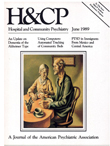Posttraumatic Stress in Immigrants From Central America and Mexico
Abstract
International migration has been associated with increased levels of psychological disturbance, particularly among refugees who have fled from war or political unrest. This study examined self-reported symptoms of depression, anxiety, somatization, generalized distress, and posttraumatic stress disorder (PTSD) in a community sample of 258 immigrants from Central America and Mexico and 329 native-born Mexican Americans and Anglo Americans. Immigrants were found to have higher levels of generalized distress than native-born Americans. Fifty-two percent of Central American immigrants who migrated as a result of war or political unrest reported symptoms consistent with a diagnosis of PTSD, compared with 49 percent of Central Americans who migrated for other reasons and 25 percent of Mexican immigrants. The authors call for more research to document the psychosocial aspects of migration.
Access content
To read the fulltext, please use one of the options below to sign in or purchase access.- Personal login
- Institutional Login
- Sign in via OpenAthens
- Register for access
-
Please login/register if you wish to pair your device and check access availability.
Not a subscriber?
PsychiatryOnline subscription options offer access to the DSM-5 library, books, journals, CME, and patient resources. This all-in-one virtual library provides psychiatrists and mental health professionals with key resources for diagnosis, treatment, research, and professional development.
Need more help? PsychiatryOnline Customer Service may be reached by emailing [email protected] or by calling 800-368-5777 (in the U.S.) or 703-907-7322 (outside the U.S.).



